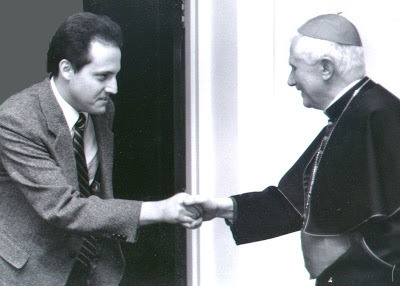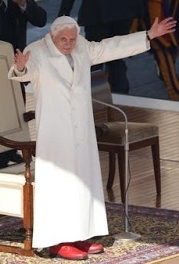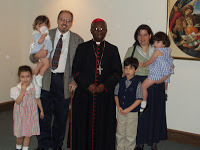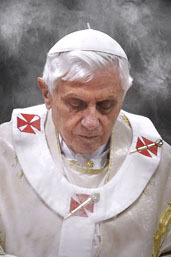John Janaro's Blog, page 302
March 1, 2013
Only God Can Begin
 He has called himself a simple pilgrim, taking up the final stage of his journey. It seems like he has disappeared, and yet in these days Benedict the Pilgrim remains vitally important for the Church. We should seek to unite ourselves with him in prayer and sacrifice for the good of the Church and all of humanity.
He has called himself a simple pilgrim, taking up the final stage of his journey. It seems like he has disappeared, and yet in these days Benedict the Pilgrim remains vitally important for the Church. We should seek to unite ourselves with him in prayer and sacrifice for the good of the Church and all of humanity.We are a people who seek something new in the midst of this Year of Faith. We seek a new depth of conversion, of encounter with Jesus, of friendship with Him. We are beginning to realize that the "New Evangelization" is His initiative; it is His work in history, which we are called to discover, adhere to, and follow.
And we now know that it involves surprises; it is a journey that is taking us places beyond our dreams and plans. Let us follow with confidence, and continue to be formed by the wisdom the Lord has communicated to us through this great Pope, whose words have become more radiant and penetrating in the light of his witness of fidelity and self-surrender to the love of God.
"Only God can begin, we can only cooperate, but the beginning must come from God.... Only the fact that God precedes us makes possible our own walking, our cooperation, which is always just a cooperation, not our own simple decision. Therefore, it is always important to know that the first word, the initiative itself, the true activity comes from God and only by inserting ourselves in this divine initiative, only begging this divine initiative, we too can become - with Him and in Him - evangelizers" (Benedict XVI).
Published on March 01, 2013 20:00
February 28, 2013
Pope Benedict: Thank You for Leading the Way
 Cardinal Ratzinger meets a young theology student during his visit to the
Cardinal Ratzinger meets a young theology student during his visit to theDominican House of Studies in Washington, D.C., in January of 1990.
Pope Benedict XVI. Josef Ratzinger. How can I even begin to fathom what this man has given to me? He has been a guiding and teaching presence in the Church for the whole of my adult life.
Remember, Cardinal Ratzinger came to Rome to head the Congregation for the Doctrine of the Faith in 1981. I was 18 years old, and a freshman in college. By the time I figured out that I wanted to study theology, he was already well established as a figure of authority.
For a great part of my adult life, the overall reference point for the mind of the Church was "the Pope...and Cardinal Ratzinger." They worked with an exquisite harmony, and with a remarkable complementarity of temperament and method, in what must have been one of the truly great friendships of Christian and human history.
It was very hard for a person like me to study academic theology in the 1980s. There were ideas everywhere, and a lot of these ideas sought to reinterpret Christianity and reduce it to the limits of various human ideologies. But there were also great insights, real theological development that was (and still is) being patiently and carefully discerned and incorporated into the teaching of the Church. The profound intelligence, learning, and above all the ecclesial sense of Cardinal Ratzinger helped to steer the Church through these deep and often strange waters.
For me and many others who became Catholic theologians during this period, he was a touchstone and an outstanding example. He showed us that the theologian must be above all a homo ecclesiasticus, a "man or woman of the Church." He showed us that true "openness" was the openness of a faith lived out in the communion of the Church, and that the teaching of the Church was not an oppressive domination, but rather a loving service to the sustenance of this communion. He showed us this by his clarity, his humility, his patience, and by the fact that he was sacrificing himself every day to carry out the Church's teaching mission, to bear the often misunderstood authority and responsibility entrusted to him out of love for Jesus and love for the Church.
Just by watching him, we learned that the Church was a living reality, and that "fidelity to Catholic teaching" was not a matter of politics, but a matter of being faithful to a real relationship with Jesus, and adhering to His continual presence within the ecclesial communion. For anyone who was looking and listening, it was clear that his commitment was not just to some thing or some task, but to Someone.
Remember, I'm talking about Cardinal Ratzinger. Nobody ever dreamed he would be Pope someday.
The picture above recalls an event that I shall always treasure. The American branch of the John Paul II Institute for Marriage and Family first opened in the beautiful Dominican House of Studies in Washington, D.C. I was already a lay student with the Pontifical Faculty at DHS, which was still an unusual thing in the 1980s (now they have a whole program for lay people, of course). The JPII Institute brought in a lot of lay students, and enriched the atmosphere of this unique place.
In January of 1990, Cardinal Ratzinger was in Washington and he came to give a talk to the new JPII Institute. The audience was restricted to people associated with the Institute, and of course the Dominican faculty and its students. The great old chapel was nevertheless bursting with people, and Ratzinger delivered a profound, erudite, and magnificently balanced assessment of the problems and the possibilities of Liberation Theology.
Then he invited the students to an informal discussion, and we moved to a large but still intimate classroom, Aquin Hall. There we had a chance to meet him and shake his hand, and--of course--get photographed. Indeed, that clean shaven fellow with hair on his head in me, 22 years ago. Cardinal Ratzinger was shy and courteous. A handshake and a greeting. No small talk. He was a shy and simple man.
Then the students were seated and the questions began, and something happened! The "professor in him" came alive. The session was spontaneous and vibrant, and he was fully caught up it. The classroom. It was clear that this was what he loved to do. Faith seeking understanding; faith and reason integrated in the heart of a man. He loved being with the students. "Archbishop" and "Cardinal Prefect" were not his idea. The Bavarian priest and professor had embraced it all with loving sacrifice.
It was a great joy to spend this time with him, these moments in which we caught a glimpse of his dynamic and serene heart. It looked like they had to drag him away, finally. I think he would have been happy to stay up until 2:00 AM with us. But he had stayed long enough to show us that in following Jesus, self-sacrifice is transformed into an abundant gift. None of us could have imagined how great that gift would become, fifteen years later....
Pope Benedict XVI, thank you for a lifetime of following Christ in His Church. Jesus has blessed you. He gave you a great classroom, the whole world, and you have been a wonderful teacher. And now he is calling you to offer everything, yet again, and to begin an unprecedented journey into the contemplative heart of the Church. In passing on the office of St. Peter, you are bearing witness to the world that "the keys to the Kingdom of Heaven" are not given for personal self-exaltation, or domination of some over others, or oppression, or any power that we can measure and define in the terms of this world. Instead you are showing us that the communion of God's people is sustained by trust in Jesus, by faith and love and confidence in His promise that He will always be with us.
Published on February 28, 2013 09:40
February 27, 2013
Benedict XVI and Us: "A Living Body"

"One can touch what the Church is– not an organization,not an association for religious or humanitarian purposes,but a living body,a community of brothers and sistersin the Body of Jesus Christ, who unites us all.To experience the Church in this wayand almost be able to touch with one’s handsthe power of His truth and His love,is a source of joy....
"God guides His Church,maintains her always,and especially in difficult times.Let us never lose this vision of faith,which is the only true visionof the way of the Church and the world.In our heart, in the heart of each of you,let there be alwaysthe joyous certainty that the Lord is near,that He does not abandon us,that He is near to usand that He surrounds us with His love."
Pope Benedict XVI,from the General Audience of February 27, 2013
Published on February 27, 2013 10:48
February 26, 2013
A Hope That Endures
 Sometimes people read my book and say, "I really admire that guy." You know, the little jumping fish that doesn't give up, and all that. I've tried as hard as I can to disillusion people, but if it hasn't worked, all I can say is that you'll have to wait for Eileen Janaro to publish her version of the story (we joke about this--she could call it I Give Up! My Husband: Lord, Have Mercy!).
Sometimes people read my book and say, "I really admire that guy." You know, the little jumping fish that doesn't give up, and all that. I've tried as hard as I can to disillusion people, but if it hasn't worked, all I can say is that you'll have to wait for Eileen Janaro to publish her version of the story (we joke about this--she could call it I Give Up! My Husband: Lord, Have Mercy!).Seriously, I would rather point to God's mercy and remain in the background (even as I struggle with the immature part of me that always wants attention). Perhaps the book's subtitle should have been: God's Mercy and The Reality of Human Life. The circumstances of my story reflect my experience of being a human being. If I have anything worth sharing, it is not because of me. It is because of the greatness of the love of God.
The fact is that everybody suffers in an intensely personal way. I really hope that people will read the book and discover their own relationship with Jesus. I tell the story of some of my struggles with physical and mental illness, with the apparent collapse of my career and my work, with a premature baby seven months in the hospital, etc. Obviously, this has been some tough stuff in my life. But when I talk to other people, inevitably I find that they have things in their lives that are overwhelming to them.
People have all kinds of suffering and all kinds of problems, and their pain is very real. People have problems with illnesses, relationships, spouses, kids, parents, jobs, money, loneliness, disappointment, God (yes indeed), sin, addiction, loneliness, dryness, boredom, loneliness, loneliness, anger, frustration, loneliness, the sense of failure (they're "stuck;" they're "not appreciated;" their lives don't mean anything; they're getting old and they've "missed" life; or they're young and anxious and confused). Did I mention loneliness? There is this strange and profound loneliness, because life doesn't seem to fulfill its promise, because spouse, family, and friends fall short of the human person's need for love.
Every person suffers, and in our culture we flee from suffering and pursue false promises of comfort and happiness (which lead to more suffering). Eventually, however, we will be humbled and required to confront our own brokenness. At this point, we can give up. Or we can allow that mysterious cry from the roots of ourselves to surge up: the cry for help, the cry of expectation, the cry of a hope that endures in us in the midst of every kind of darkness and desperation. We know that life is a promise, and thus we continue to ask, and we let ourselves become little again, and willing to be led by the hand.
As for me? I am just like everybody else. I run away from suffering as fast as I can, and seek distraction and anesthesia just as much as anyone else. But I was "blessed" in a way. Suffering caught up with me and cracked me over the head, and so I was forced to deal--a little bit--with real life. I have attempted to express in my book the need for the mercy of God that we all have, and that we are provoked to recognize by our suffering.
Published on February 26, 2013 12:34
February 25, 2013
Measure
Today's Gospel:
"Be merciful, just as your Father is merciful. Stop judging and you will not be judged. Stop condemning and you will not be condemned. Forgive and you will be forgiven. Give and gifts will be given to you; a good measure, packed together, shaken down, and overflowing, will be poured into your lap. For the measure with which you measure will in return be measured out to you" (Luke 6:36-38).
What is my measure?
"Be merciful, just as your Father is merciful. Stop judging and you will not be judged. Stop condemning and you will not be condemned. Forgive and you will be forgiven. Give and gifts will be given to you; a good measure, packed together, shaken down, and overflowing, will be poured into your lap. For the measure with which you measure will in return be measured out to you" (Luke 6:36-38).
What is my measure?
Published on February 25, 2013 12:05
February 24, 2013
To Tree or Not To Tree?
I'm taking a break from trying to understand the universe, because there has been a major change on the property of The Janaro Estate. An important landscaping event has occurred. Here it is in "dramatic-contrast" picture form.
See this tree?

Ka-Baaam!!! What happened to the tree?

How did one of our trees become a pile of wood? This tree has been a fixture on our Front Lawn since the beginning, since...the children's childhood! It has been the background for family pictures. It has waved in the breeze and given shade for years. It has stood guard over our driveway, and provided shelter for the birds to make their homes and poop on our cars!
Our tree! Our beloved tree! I think that I shall never see / a poem as lovely as...um...ummm...this great big plant. O shucks, that doesn't rhyme. Anyway....
The tree has been 90% dead for several years. We didn't want those majestic branches (which were rotting) to fall suddenly on top of a car or a child (or a grownup).
So, did I march my fifty year old self out there, brawny and with ax in hand, and chop that old tree down and split the wood into those pieces you see right there? That's what Pa Ingalls would have done, right? So did I? Did I?
Nope.
You gotta be kidding. What really happened is that the wonderful town of Front Royal did us a favor. Because they are so nice and they really care. And also because they didn't want those tree branches to fall on the power lines and cables that run in front of our house. The friendly tree trimming people came by and offered to cut the whole thing down. For free. And let us keep the wood (which we're giving away to our wood burning friends--more than half of it is gone already). For free.
Why would we say no?
So down it went, one day last week while we were all at school. We returned home to this pile, along with a couple of very confused cats.
They took the rotten wood away and left us with the good wood. There was plenty of good wood. Who knows, maybe a tree doctor or a tree-whisperer could have saved the grand old man. Ah well....
The kids are planning a garden in the spring in this new spacious area. Thus, the earth will bring forth life in new ways. Children and cats will frolic in the grass.
And the birds will have to find somewhere else to poop.
See this tree?

Ka-Baaam!!! What happened to the tree?

How did one of our trees become a pile of wood? This tree has been a fixture on our Front Lawn since the beginning, since...the children's childhood! It has been the background for family pictures. It has waved in the breeze and given shade for years. It has stood guard over our driveway, and provided shelter for the birds to make their homes and poop on our cars!
Our tree! Our beloved tree! I think that I shall never see / a poem as lovely as...um...ummm...this great big plant. O shucks, that doesn't rhyme. Anyway....
The tree has been 90% dead for several years. We didn't want those majestic branches (which were rotting) to fall suddenly on top of a car or a child (or a grownup).
So, did I march my fifty year old self out there, brawny and with ax in hand, and chop that old tree down and split the wood into those pieces you see right there? That's what Pa Ingalls would have done, right? So did I? Did I?
Nope.
You gotta be kidding. What really happened is that the wonderful town of Front Royal did us a favor. Because they are so nice and they really care. And also because they didn't want those tree branches to fall on the power lines and cables that run in front of our house. The friendly tree trimming people came by and offered to cut the whole thing down. For free. And let us keep the wood (which we're giving away to our wood burning friends--more than half of it is gone already). For free.
Why would we say no?
So down it went, one day last week while we were all at school. We returned home to this pile, along with a couple of very confused cats.
They took the rotten wood away and left us with the good wood. There was plenty of good wood. Who knows, maybe a tree doctor or a tree-whisperer could have saved the grand old man. Ah well....
The kids are planning a garden in the spring in this new spacious area. Thus, the earth will bring forth life in new ways. Children and cats will frolic in the grass.
And the birds will have to find somewhere else to poop.
Published on February 24, 2013 10:05
February 23, 2013
I Am Not Very "Good at Suffering"
 Click here to learn more!I am not scandalized by the fact that I am not very “good at suffering.” Perhaps I am improving. Suffering produces humility. It simplifies life. It teaches us patience. It teaches us what is really important. It is a grace that allows us to help others, to share their burdens, to be merciful to our fragile brothers and sisters. It heightens our sensitivity to the terrible evil that is in the world, and to the coldness of human hearts that reject the love of God. In it we begin to share in the sorrow Jesus expressed over the world, and the burning love with which He desires to save it.
Click here to learn more!I am not scandalized by the fact that I am not very “good at suffering.” Perhaps I am improving. Suffering produces humility. It simplifies life. It teaches us patience. It teaches us what is really important. It is a grace that allows us to help others, to share their burdens, to be merciful to our fragile brothers and sisters. It heightens our sensitivity to the terrible evil that is in the world, and to the coldness of human hearts that reject the love of God. In it we begin to share in the sorrow Jesus expressed over the world, and the burning love with which He desires to save it.God gives us the grace to want to satisfy that burning love of Jesus, to grow to the measure of that love. We also begin to glimpse those terrible dark places: human hearts without God, burdened with the horrible reality that we call “mortal sin” and not even knowing it; human hearts that are willingly seeking the darkness, or who are oppressed by violence and can only bring forth violence in return. It is here especially where Jesus’s pain reaches its greatest anguish. He loves each of these hearts, and He draws us into this love too.
All of this awareness comes with time, and in the measure in which God chooses to give it. I remain at the beginning of this mysterious road. I can say these things, and yet, when it comes to my own trials I seem to lose sight of the connections and start to flounder. My sufferings seem to be nothing else but humiliation; I feel like I am being crushed, or suffocated. And what is it after all—petty things! The voice of discouragement begins to creep in. There is always the danger of discouragement. But God’s mercy is stronger, and I cry out to Him.
I have begun to trust Him because I have seen that He does not leave me alone. It is like that moment in Peter’s life when, after beginning to walk on the water, he panics and starts to sink. Jesus reaches out and grabs him. When I am drowning, this is the one thing and the essential thing: let Him grab me.
--from Never Give Up: My Life and God's Mercy
Published on February 23, 2013 12:33
February 22, 2013
Who Will Fill the Vacant Chair?
 This is not St. Peter's chair. This is my chair. It is never infallible,
This is not St. Peter's chair. This is my chair. It is never infallible,ever. He who sits in it is assured of only two things: (1) frequently
falling asleep; (2) being climbed on by a child, without warning!Happy Feast of the Chair of St. Peter...the chair that will soon be vacant! Its interesting that we commemorate today the unique episcopal office exercised by the Bishop of Rome, even as we prepare to witness an historically unprecedented change in that office. Benedict is leaving in less than a week! I'm sure that the final words and gestures of his papacy will enable our hearts to grow, even as we endure them in sorrow.
Meanwhile it is only human to wonder, "Who will succeed him?"
Yes, the conclave drama has captivated me. I'm reading about cardinals (and there are a lot of really, really good ones). My conclusion? I have no idea who next pope will be. Not a clue.
And I'm okay with that. God is good. He will take care of His Church.
The wonderful Cardinal Arinze from Nigeria, who worked many years in the Roman curia, has helped me keep perspective. He gave a recent video interview, in which he said, with his expressive face and lovely Nigerian English enunciation: "Don't Worry! The Holy Spirit does not go on holidays!" [You can find it on YouTube...I should try to update this later with a link! :)]
 The Janaros with Cardinal Arinze, 2004.
The Janaros with Cardinal Arinze, 2004. Really, this picture is fun because of the
size of the kids. Look at John Paul, haha!He'd be a great pope. But he's 80 years old. He won't even be in the conclave. Ah, too bad.
Cardinal Arinze participated in a conference at our college in 2004. As theology department chairman, I shared in the task of welcoming him, and we were seated together at the conference. I gave him a copy of a draft of an article about John Paul II that I was working on (eventually published in 2006).
There were a couple of hours of break in the afternoon. I assumed he'd go take a nap. Instead, he read my paper. At the dinner banquet, he came to the table and his face was all bright and beaming. "I read your paper," he said to me. "Its wonderful! You are an 'expert' on the Pope." Well, that was encouraging, even though it was not deserved. I am a student of John Paul II, but not an expert.
I haven't spoken with him since then, although he has come back to Front Royal many times. He has participated in various college and graduate school events. He's even played tennis on the tennis courts. Cardinal Arinze pops up all the time, it seems. I haven't run into him at K-Mart yet, but if I ever do, I won't be surprised!
He was just here less than a month ago, participating in a conference of Catholic college presidents (he strongly supports the "alternative" Catholic colleges and schools, because they are faithful to the teachings of the Church; I'm sure it also helps that, as an African bishop, he has an appreciation of what it takes to build institutions from scratch).
While he was in town, he said Mass and met with the students of Chelsea academy. The little boy in the picture on the right, who is now as tall as the Cardinal, asked the first question. My son! :)
Cardinal Arinze is wise and learned, but very down to earth, with joy, a great sense of humor (really, he's hilarious), and tons of common sense. He loves Jesus, and he loves the Church, with intelligence and simplicity.
The younger cardinals from the developing world have a similar sensibility. They radiate the faith and love, the strength and the struggles of their churches. That doesn't mean that its "time" for an African pope or an Asian pope, etc., etc. Who knows?
God knows. Maybe it will be the most obscure and unaccomplished cardinal in the conclave. Whoever he is, the next pope will be the successor of St. Peter and occupy his chair. He will be responsible for keeping everyone focused on the reality of Christian faith and life. The successor of St. Peter will be concerned with fostering and preserving the opportunity for everyone to share in Peter's confession of faith, which is at its core the recognition of and relationship with a Person.
Conclaves, popes, cardinals, bishops are instruments and servants of the grace that comes from the Father, the grace that enables you and me to meet Jesus today, and to recognize who He is, to cry out with faith and love, "You are the Christ, the Son of the Living God!"
Published on February 22, 2013 11:04
February 20, 2013
Benedict: Following the Hunger for God
 Below these reflections, I have reproduced a post from one year ago on "secularization". The problems it addresses are still very much with us.
Below these reflections, I have reproduced a post from one year ago on "secularization". The problems it addresses are still very much with us.Pope Benedict knows this very well. He is not quitting in the face of this crisis. Rather, he is resigning his office in order to follow the call to seek God in prayer, to offer the sufferings of his present physical condition in humility and silence before God.
It seems appropriate to revisit a point central to the eight years of Benedict's pontificate, because the secularized world cannot really understand why he has made his decision. A world without God does not understand the value of prayer, and therefore has no understanding of what Benedict means when he says he desires to "continue to serve the Church" by offering himself to God in prayer. Benedict lives a relationship with Christ in the Church, and he is now turning to prayer not simply for "practical" reasons. These constitute some of the circumstances he faces, of course, but at its core his decision is motivated by the conviction that this is the path of his vocation, the next step in a lifetime of hungering for God and seeking to know Him more intimately in an ever deeper personal encounter with Jesus Christ. He knows too that this hidden life is not an escape, but a profound way of entering into a deeper communion with his brothers and sisters, a way of offering himself to Christ in the communion of the Church in the context of his present sufferings, after a long life of dedicated pastoral service.
I am confident that his prayers will sustain his successor so that he can give a strong and attentive witness to the truth about God and His love for us in Jesus Christ--the truth that is everywhere attacked, ignored, or falsified with cheap substitutes.
My "introduction" has turned into a post of its own. Nevertheless, let me present the thoughts of last year, given in the context of the words of the Pope. Here is the post of February 17, 2012, which was called Secularization, Transcendence, and Love:
-----------------------------------------------------------------------
Sometimes we throw around terms like "secularism" and "the secularized West." It is important to be precise about what this means. Terms like these are not intended to cast "the secular world" in a negative light. Rather they are intended to express an ideological and practical attitude that limits the human person to the life of this finite world. Pope Benedict XVI explains it very concisely:
"Secularization, which presents itself in cultures by imposing a world and humanity without reference to Transcendence, is invading every aspect of daily life and developing a mentality in which God is effectively absent, wholly or partially, from human life and awareness."Secularism imprisons the human person within the confines of "the world." Sometimes it restricts itself to the world as human beings immediately perceive it (e.g. materialism). But it can allow for the affirmation of "deeper realities," and for the development of human beings and the universe under the influence of "mysterious" natural powers (e.g. the many kinds of spiritualisms that flourish today, as well as a reductionist view of religion).
Secularism is a proposal of life "without reference to Transcendence." The essence of secularism is its effort to smother the deepest reality in the life of every human person, that thirst for the Infinite that shapes every human heart. The "transcendence" that Pope Benedict speaks of here is not just any kind of "going beyond" the surface of things. It is the Beyond-all-things, that Mystery which energizes the human person and is the ultimate goal of every human aspiration. Secularism seeks to suffocate this "restlessness" of the human heart.
It does not forbid a person to be "religious" (provided that "religion" is reduced to a human system, or a set of rules that rest on human contrivance, whether ancient or new). It does not have a problem with "spirituality" as long as the "spirit" remains in the finite prison of its own idealism, or of the occult. Secularism is even compatible with talk about God. But it wants to eliminate the search for God, the hunger for God, and of course, love for God.
Above all, however, secularism cannot abide the amazing fact that the Transcendent God --the Mystery that every human heart yearns for--has entered history and dwells among us in the very midst of our world. In the end, this is why secularism is doomed to fail: because God wills to make Himself known, because He loves us. He loves every human person, even the most determined secularists who appear to have forgotten all about Him.
The witness to Jesus Christ as God's loving gift of Himself is difficult in our secularized culture. But let us never forget that His grace is at work.
Published on February 20, 2013 04:48
February 18, 2013
Josefinology

We're hanging around the table after breakfast, just her and me.
Josefina: "Jesus is powerful!"
Me: "Yes indeed."
Her: "He's like...a wizard!"
Thanks a lot, Gandalf. My little girl thinks Jesus is a wizard. At first that sounds creepy, but of course it has nothing to do with the occult. As far as the imagination is concerned, Middle Earth and Narnia pretty much rule around this house.
She's talking about a "Tolkien wizard" which is a very particular kind of entity.
All our other kids have read the books, and thanks to Peter Jackson, Gandalf is everywhere, on screen, but also on calendars and coloring books and coffee mugs and cereal boxes.
Tolkien's "wizards" play an open role in his imaginative world and its cosmic laws. Their "powers" are part of their "office" within the overall (and mysteriously providential) government of middle earth and its unfolding "history;" they belong to the ordinary structure of Tolkien's imaginary universe. And there's much more that I could say about this, but lets go back to the conversation.
So is Jesus "like" Gandalf? That's a pretty smart question, actually. Imagination and intelligence are working together.
Me: "No, its not the same, honey. The wizards in the story have some powers, but Jesus is God. Jesus can do anything, because He is God. The wizards can't create things, but Jesus is the Creator of everything."
Her: "So Jesus can't die!"
Me: [Hmmmmm....] "Well, God can't die. But God became a man, and He died for us. He died for each one of us, because He loves us; He died and He rose from the dead, so that we could live with Him forever in heaven. Remember there is only one God, but He is three Persons, the Father, the Son, and the Holy Spirit, like when you make the sign of the cross, three Persons, one God. Jesus is God the Son, and He took our human nature to be with us. Jesus is God and man."
Yes, I really said something like that. Children are not dumb. We have to tell them who Jesus is, because they're already trying to work it out. Experience, imagination, and understanding need to be integrated in everyone's life. It starts in childhood, and the Montessori Catechesis of the Good Shepherd follows an integrated method from the beginning. We started Josefina in CGS when she was not yet 3 years old.
Not long after that, she started asking questions. Once she asked me, "How does Jesus come into you and take your soul outside of your body when you die?" Gosh. I don't remember what I said then. She was 4 years old, maybe.
Sometimes when we finish grace, Josefina keeps her head down and her hands folded. She wants to say some special prayers (and she won't tell anybody what they are). The Lord must love these prayers. Another thing about the Montessori Catechesis: the children learn to pray. They learn the beauty of silence.
But let me return to this conversation. I concluded by saying...
Me: "These are mysteries we believe. We can't understand them."
Her: "Jesus is more powerful than a lion!"
Me: *puzzled* "aaah...yes!"
And we moved on to other things. It was a few minutes before I realized <facepalm> that she was talking about Aslan!
Published on February 18, 2013 20:51



